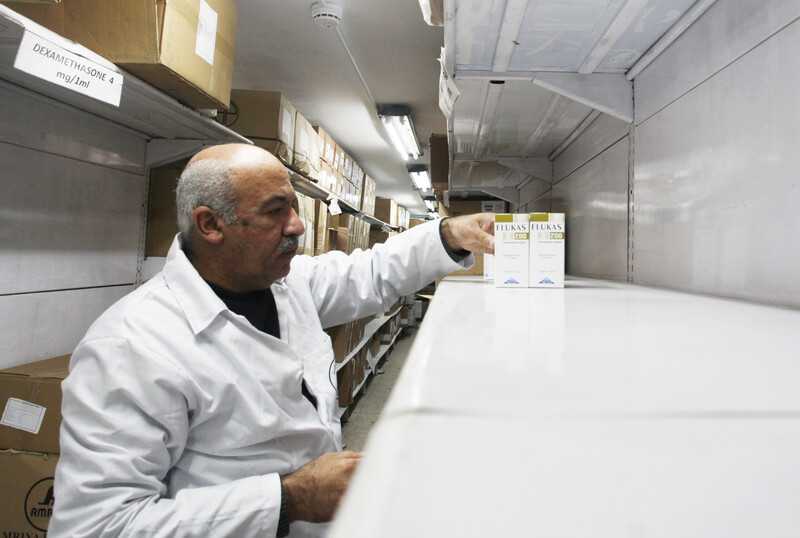The Electronic Intifada 14 April 2023

Stocks of many essential medicines are depleted in Gaza.
APA imagesAmal Bahar had to wait three months before she could see a doctor in the ear, nose and throat department at Gaza City’s al-Shifa hospital.
Throughout that time, she had tinnitus.
“I have a constant tingling in my ear,” she said. “At times, the pain gets severe and turns into a headache.”
The pain, she noted, can be especially acute in the evenings.
As al-Shifa is a public institution, Amal was eventually able to see a doctor there free of charge. Yet because the hospital’s resources are limited and much in demand, it took a long time before she could get an appointment.
She would have been able to receive treatment sooner if she was better-off. Yet with both Amal, 50, and her husband Wael, 55, unemployed, she cannot afford the bills.
The couple rely on disability benefits that Wael receives from the Palestinian Authority. It amounts to approximately $110 per month.
He had an accident at a building site where he was working two years ago. His right leg has been badly damaged as a result.
Amal would have to pay about $22 for a consultation with a specialist in a private clinic. She also needs to buy medicine from pharmacies, which can set her back around $40 a week.
Their dire economic circumstances have meant that Wael, Amal and their four sons go without many types of food. They have not eaten meat for the past 18 months.
“Poverty is destroying my family,” Amal said. “And my illness and all the stress in my life are destroying my health.”
The full blockade of Gaza – imposed by Israel since 2007 – has caused major problems for the healthcare system.
Stocks of essential medicines have long been seriously depleted.
And those drugs which are available can be “expensive compared to neighboring countries,” noted Hussam al-Ladgha, a local pharmacist. Importing medicines from Israel and Egypt is onerous and costly, he explained.
Battle for food
Muhammad Salem, 49, has chronic back pain. Over the past seven months, he has been waiting for an operation.
He has been recommended a number of medicines to relieve his condition. The total bill for the medicines is more than $20 per week.
Unemployed for the past seven years, Salem cannot afford that amount.
He also cannot pay the fees charged by many doctors. While he can see doctors in public hospitals free of charge, they tend to be overworked.
On occasions, he has arrived at the hospital for appointments in the early morning but had to wait until the afternoon before a doctor could see him.
“I am in bad pain every day,” he said. “And I find it hard to sleep. I am anxious all the time.”
Victims of Israel’s brutality frequently have to make do with inadequate treatment.
Muhammad Diab, now aged 34, was shot in his left leg by an Israeli sniper in May 2018. He was participating in the Great March of Return – protests to demand that Palestinians be allowed to realize their basic human rights.
Diab has undergone a series of operations. He has encountered various complications, including an infection in his leg.
Requiring a knee replacement, he ought to be seeing doctors regularly. Yet because he cannot afford to pay medical fees, he is only able to have examinations once every two months.
The painkillers he receives do not provide sufficient relief, he said.
“I am unemployed and have three children,” he said. “Before my injury [in 2018], I was a construction worker. Today, I am wounded and poor, relying on help from my brothers. I cannot pay for the treatment that I need.”
According to the latest official data, approximately 44 percent of people aged 15 years or older in Gaza are unemployed. About 80 percent of Gaza’s two million people depend on humanitarian aid.
Dr. Shawqi al-Baba, an orthopedic surgeon, noted that many people in Gaza are not having medical issues properly checked as they cannot pay fees. Health problems are known to worsen as a result.
“For the poor in Gaza, going to a doctor is often the last resort,” he said. “The main struggle here is for food.”
Zuhair Saad, 50, echoes that view. He has diabetes and high blood pressure yet seldom visits a doctor.
“I have been unemployed for 10 years and I have three unemployed sons,” he said. “For the poor in Gaza, going to clinics and buying medicines are additional strains. We face a daily battle to find food.”
Ola Mousa is an artist and writer from Gaza.





